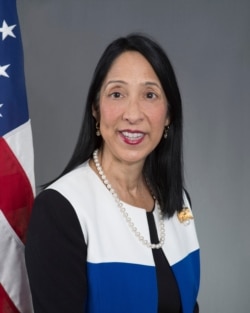Elections are essential to ending Haiti’s longtime “political paralysis,” U.S. Ambassador to Haiti Michele Sison told VOA in an exclusive interview Friday.
"What troubles us is governance by decree, governance by presidential decree that has been going on in Haiti for a period that is not normal and is ongoing," Sison said.
The ambassador told VOA that U.S. President Joe Biden and Secretary of State Antony Blinken "said clearly that democracy and human rights have a central place in American foreign policy.”
Sison expressed concern about recent political events in Haiti, including an alleged coup and assassination attempt against President Jovenel Moise on February 7.
Twenty-three people were arrested in connection with the plot, including Supreme Court Justice Yvickel Dabresil.
The justice was released from detention on Thursday (Feb. 11) after national outcry and international expressions of concern. Twenty others remain in detention.
When does Moise’s term end?
The Biden administration has been criticized for supporting Moise's claim his term should end in 2022. The Haitian opposition argues his term expired on February 7, 2021.
"The superior council of the judiciary branch, who in principle has the last word on all political and judicial conflicts - has ruled that Jovenel Moise's term ended on February 7," lawyer Andre Michel, the representative of the Democratic and Popular sector of opposition groups told VOA.
Sison said the United States and its allies agree on the 2022 end date.
"The Haitian people elected President Jovenel Moise in November 2016. President Moise was sworn in on February 7, 2017 for a five-year term that will end on February 7, 2022. That is the same analysis that the OAS made - the Organization of American States," the ambassador told VOA.
U.S. Senator Patrick Leahy, House Foreign Affairs Committee Chairman Gregory Meeks, and Congressman Andy Levin, also a member of the committee, however, have agreed with the opposition that Moise's term ended on February 7. They say a provisional government should be formed by members of the opposition to organize legislative and presidential elections as soon as possible.
"Feb 7th marks the end of Pres Moise’s term in Haiti. The country is in worse shape than when he began w/ rampant poverty, corruption & gang violence in which the govt is complicit. The US should join in calling for an inclusive transition that represents the Haitian people," Leahy tweeted.
"With no evidence to support his claims of a conspiracy against his life, Moïse is demonstrating what my colleagues and I have said: there is zero chance of real elections, real democracy or real accountability while he remains in power," Levy tweeted.
“Today I co-led a letter to @SecBlinken with @RepYvetteClarke to condemn President Moïse's undemocratic actions in Haiti, urging for a Haitian-led democratic transition of power,” Meeks tweeted.
What everyone agrees on
All political actors seem to agree on the need for elections but not on the specifics.
Moise insists that a referendum must first be held in April to approve a new constitution before holding presidential and legislative elections in September.
The opposition has said it will not participate in any election organized by Moise's Provisional Electoral Council. It objects to the very creation of the council, which was hand-picked by Moise, with no opposition or civil society involvement.
Sison says all political actors should set their differences aside and focus on what's best for the people of Haiti.
"Political and economic stability is only going to come when Haiti's leaders set aside their differences. When they set aside their differences in order to serve the Haitian people. And set aside their differences also to support Haiti's democratic institutions," she told VOA.
"So, we share the Haitian people's concern about insecurity and the health and education sectors and food insecurity. We share their concerns about gang violence," she added.
US backs ‘inclusive solution’
Sison said the administration is supports an "inclusive solution."
"People have got to talk to each other. And they've got to find peaceful means to resolve their differences," she told VOA.
"Political polarization has affected governance. It has affected the lives of the Haitian people," she added.
Moise has also stressed the need for unity and the setting aside of differences to resolve the political impasse.
“The battle I’m waging is not for myself, it’s for you,” Moise said in a national address hours after announcing the coup attempt.
“I’m not here to lie to you today, I’m here to tell you the truth. … My brothers and sisters in the opposition, don’t let pride, revenge, selfishness keep you from working with me,” he said.
Moise’s government recently signed an agreement with the United Nations to help Haiti finance the organization of elections.
“A sum of 20 million American dollars has been deposited in a ‘basket fund’ by the Haitian government to organize the referendum and general elections. I congratulate the government for its efforts to allow the people to renew their political personnel,” Moise tweeted in French.
Asked if the United States was also prepared to contribute financial assistance to the Moise government for organizing elections, Sison said "legislative elections must be held as soon as technically feasible so the parliament's rightful role can be restored.”
“Free and fair presidential elections must also be held so that a newly elected president can succeed President Moise at the end of his term," she said.
Sison added "we ARE committed to the people of Haiti. The people of Haiti are our neighbors. We want to see a more secure and prosperous future for Haiti and for the region. It is a region that we all share."
Jean Robert Philippe contributed to this report.






